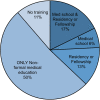Assessing Comfort of Physicians to Provide Transgender-Specific Care
- PMID: 36644117
- PMCID: PMC9829139
- DOI: 10.1089/trgh.2021.0074
Assessing Comfort of Physicians to Provide Transgender-Specific Care
Abstract
Purpose: Transgender individuals disproportionately face barriers to accessing and receiving health care. This study examines physician comfort in managing and caring for the unique health needs and barriers that transgender patients encounter. We predicted that increased exposure to a transgender person, prior treatment of a transgender patient, and transgender health education would increase comfort in providing care to transgender individuals.
Methods: A Qualtrics® survey link was sent through mail to actively licensed physicians within the state of Nevada. Questions related to perceived comfort level were measured on a 10-point scale (1=lowest level of comfort, 10=highest level of comfort) and dichotomized for analysis (1-5=not comfortable, 6-10=comfortable).
Results: Survey response was 62 of 1620 (4%). Comfort with providing transgender patients routine care (87%) and sex or gender-related care (68%) was high, whereas comfort with providing hormonal treatment (26%) was low. A majority (61%) of respondents either had no training or obtained their training through a nonformal avenue (e.g., self-study and literature review) regarding transgender health issues. Although there was no evidence that knowing a transgender person (p>0.165) or having more education (p>0.489) significantly improved comfortability with treatment, respondents who had previously treated a transgender patient had greater comfort providing routine (p=0.059) and sex or gender-related care (p=0.011).
Conclusion: Although the results show that a majority of physician respondents in Nevada feel comfortable providing routine care to transgender patients, they also reveal a need for education that incorporates experience with transgender patients and a need for widely available guidelines on hormonal treatment of transgender patients.
Keywords: physician comfort; transgender health; transgender medical education; transgender medicine.
Copyright 2022, Mary Ann Liebert, Inc., publishers.
Figures
References
-
- Safer JD, Tangpricha M. Care of the transgender patient. Ann Intern Med. 2019;171:ITC1–ITC16. - PubMed
-
- Flores AR, Herman JL, Gates GJ, Brown TNT. How Many Adults Identify as Transgender in the United States? Los Angeles, CA: The Williams Institute. 2016.
-
- James SE, Herman JL, Rankin S, et al. The Report of the 2015 U.S. Transgender Survey. Washington, DC: National Center for Transgender Equality. 2016.
LinkOut - more resources
Full Text Sources

